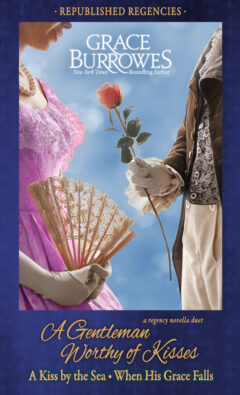A Gentleman Worthy of Kisses
A novella in the Republished Regencies series
A Gentleman Worthy of Kisses–A Republished Regency Novella Duet
A Kiss by the Sea
He’s not really a blacksmith, and she’s not really an heiress…
Thaddeus Pennrith finds a way to recover from multiple griefs when he accepts the blacksmith’s post at Fenwick on Sea. Village life gives him a sense of belonging that Polite Society never could, though he must resume his aristocratic duties soon. Along comes Lady Sarah Weatherby, refugee from an engagement gone badly awry, and Thaddeus is faced with both a compelling reason to reveal his titled antecedents, and a longing to keep them forever hidden….
NOTE: This story originally appeared in the Bluestocking Belles’ anthology, Storm and Shelter, where you will find more tales of romance by the seaside!
When His Grace Falls
The very proper Duke of Emory, lampooned in the popular satire How to Ruin A Duke, suspects that the author of his misfortune is Lady Edith Charbonneau. He sets out to ruin her before she can write a sequel, except… what if he’s wrong, and she’s not his enemy after all? Edith, formerly companion to His Grace’s difficult mother, has plenty of reasons for her dim view of the duke’s household, but the man himself has never been one of them. Will they learn to trust another, or embark on a war of words, wit, and wanton kisses?
This novella originally appeared in the novella duet, How to Ruin a Duke, published in 2019 and no longer available as a duet (alas!).
Enjoy An Excerpt







A Kiss by the Sea
Chapter One
A blacksmith’s job was mostly solving problems for mute beasts. The squire’s morning gelding was shying at stiles. Miss Fifi’s stoat of a pony was three-legged lame. Because the animals could not convey the details of their difficulties, an astute blacksmith learned to notice what was otherwise ignored.
For Thaddeus Pennrith—Thad Penn to his neighbors in Fenwick on Sea—ignoring the lady in the elegant coach would have been impossible. Her coachy, groom, and footmen had the martyred air of London servants forbidden to wear fancy livery, while the team in the traces—matched chestnuts, white stockings on all sixteen glossy legs—fairly shouted a Mayfair provenance.
When a lady’s relief teams were London-fancy this far from Town, the lady herself was bound to be fancy as well.
She did not disappoint, though she did intrigue. Even climbing down from a conveyance into the muck of Fenwick’s thoroughly soaked high street, she had the sort of grace that comes from years of deportment instruction. The boot that first appeared on the iron step was doubtless Hoby, and polished to a high shine. The lace peeking out from the hem of the woman’s carriage dress was as frothy as summer white caps on the North Sea, and her bonnet gave the rest of the game away.
The bonnet was nearly plain, but for the green satin ribbons adorning the brim and tied under a chin charitably described as firm. A young woman chose such millinery when she wanted to go about in society without calling attention to herself. That her entire ensemble otherwise revealed her to be wealthy, pampered, and far from home had apparently escaped her notice.
Alas, great wealth and great intelligence were not always found in the same person. The lady’s expression was obscured by the brim of her bonnet, but she used that firm chin to point in Thad’s direction.
“Mr. MacAdams,” she said, hand on the footman’s arm, “please explain our situation to yonder blacksmith.”
The voice was so euphonious as to make a command into a gentle request. Thad had fled the siren call of such voices five years ago, and yet, that sheer gracious warmth blended with a just a hint of wrought iron still affected him.
When he should have turned his back on the fine lady and her sniffy servants, he instead waited for the coachman’s approach. The fellow was older, and like many a coachman, moved gingerly as he climbed down from the box. Years of battling the elements, headstrong teams, and what passed for English roads took a heavy toll on a man’s body.
“Good sir,” the coachman called, splashing across the muck. “A word. Can you refashion a spring for a vehicle designed with a post undercarriage?”
An undercarriage such as the post coaches and public stages favored was unusual on a private conveyance. The design was intended to smooth out the ride on heavily laden vehicles, and unnecessarily complicated for most personal travel.
“To whom do I have the pleasure of speaking?” Thad asked.
“John MacAdams, coachman to—”
“John.” The lady’s quiet tone had taken on more of that wrought iron quality.
“Mrs. Winston, late of Surrey,” the coachman said, drawing himself up as if that would better disguise his mendacity. “Time is of the essence and my mistress will compensate you handsomely.”
Truly, the lot of them were wanting in the brainbox. “The coach road has been washed out by the storm,” Thad said, not unkindly. “If the queen of the fairies magically repaired your coach by sunset, you’d still have nowhere to go.”
John looked askance at Mrs. Never-in-a-century-was-she-a-Winston.
She turned to regard Thad, and while he had expected her to be pretty, he had not expected her to be stunning.
Her eyes were the same green as her bonnet ribbons, a luminous, grassy hue offset by auburn hair. The combination was unusual in the English aristocracy, and given her slightly too-wide mouth, and ever so gently aquiline nose, she would never be called pretty, but neither would a man easily forget the sight of her.
And she would never be mistaken for plain Mrs. Winston of Surrey, either.
Thaddeus bowed, not to the depth a London gentleman would offer a lady of high degree, but rather, as a yeoman would bob deferentially at gentry. He remained silent, for no introductions had been made, and even a bumpkin knew not to assume uninvited familiarity with the Quality.
“We are cut off from the main roads?” she asked.
The question was put directly to Thad, so he answered. “The Great Flood would have done less damage than the storm that just came through here. If you look to the water, you’ll see the ocean is still showing the effects.” Even Granny McClintock couldn’t recall such swells in her nearly ninety years of earthly toil.
Mrs. Winston dropped the footman’s arm and approached Thad. He resorted to gentlemanly euphemisms out of old habit: The lady was well formed, her three-quarter-length spencer showing off an abundance of curves. She was of middle height, which put the top of her head in the vicinity of Thad’s shoulder.
She would be, to use less genteel parlance, a lovely armful. Not that her kind ever enjoyed armful status, which was a grand shame and a poor reflection on the Creator Himself.
“I grasp that inclement weather has made the roads impassable for a time,” the lady said. “But I must be in a position to resume my travels at the earliest opportunity. I can pay you to make my coach repairs a priority.”
“No, madam, you cannot. You are in a hurry to meet some bounder hiding from his creditors in Great Yarmouth,” Thaddeus said, “but my neighbors are in a hurry to plough up destroyed fields in the hopes of replanting so we don’t starve come winter. When I am the only fellow who can repair their ploughs, your naughty little tryst is of no moment. Every cart horse and cob in the village will pull a shoe in the muck this storm has left, and those animals are the difference between a midwife attending a difficult birthing or a mother suffering in agony with none to aid her. I’ll have a look at your coach, but I can make no promises.”
The longer he’d spoken, the more unreadable Mrs. Winston’s expression had become, until her physiognomy resembled the blank face of an Elgin marble.
Then her gaze narrowed as the wind whipped the green satin ribbons against her chin. “You are not from around here.” She visually inventoried him with all the dispassion of a bidder at Tatt’s eyeing up a new hack. “You are public-school educated. Your proportions suggest generations of good nutrition added to Viking ancestry, and you are rude. How long ago did you leave London, and why shouldn’t I alert the authorities to your whereabouts?”
Thad managed not to smile, barely. “The only authority concerned about my whereabouts is my grandmother, and I write to her each fortnight lest she have me taken up by her minions. If you can lower the tip of your nose even an inch, the innkeeper at The Queen’s Barque might find a room for you while your coach awaits repairs.”
She raised the tip of her nose, of course. “I can pay you.”
“So you’ve said, but unless you can deliver a baby, provide medical care to the sick, plough under a lost crop, or otherwise do more than beautify the landscape, your coach will have to wait.”
She glanced at her coachman, who was admiring the humble storm-washed prospect of a Suffolk village’s high street. The Queen’s Barque coaching inn was the central edifice in the hamlet, bringing the occasional eccentric traveler, news of the greater world, and the promise of escape to those longing for life beyond rural obscurity.
Thad, to his surprise, was no longer in that latter group.
“Excuse me,” Thad said, honestly forgetting to bow. “Fifi, hold up a moment.” He ambled across the smithy’s humble forecourt, the cobbles still slick with rain and brine.
A small, muddy person whom Thad knew to be of the female persuasion glowered up at him from Mrs. Peabody’s side yard.
“I can catch him, Mr. Penn. I always do.”
Fifi never caught her mount. Thelwell, named for a vicar since gone to his reward, simply grazed his fill and—being the laziest equine ever to dump child into mudpuddle—caught forty winks until Fifi led him home.
She advanced upon her shaggy steed with all the subtlety of a game beater in high brush. Thelwell flicked a hairy ear but did not cease his efforts to trim Mrs. Peabody’s yard.
“Wellie, come,” Fifi crooned. “I’ve got a bit of carrot for you.”
Wellie disdained to heed her summons. His reins trailed in the grass, and because he was hatched from the union of a demon and a unicorn, he would surely tromp upon those reins to break them when it suited his purposes.
“Wel-lie dearest, wouldn’t you like some nice scratchies?” Fifi asked, inching closer.
Thelwell sighed and toddled six feet down the hedge.
This went on for another five minutes, and all the while Mrs. Winston held her peace.
“Won’t you help the child?” she said at length. “That dratted pony will founder on spring grass before she catches him.”
Perhaps Mrs. Winston had ventured beyond the confines of Mayfair in her childhood.
“Fifi,” Thad called. “Hold your ground. I’ll have a go from the other side.” He rounded the far end of the hedge and advanced on the pony.
Thelwell, having lost several arguments with Thad at the forge, snatched a few more mouthful of grass and went to his fate with the dignity of an affronted elder. His put-upon air said that the child had come out of the saddle through no fault of her long-suffering pony, and all this grass was going to waste and looking so untidy, and truly, one grew vexed with the tedium of human incompetence.
Grandmother had the same ability to pack an entire lecture into a single sigh.
Thad tightened the girth, earning a glower from the pony, and used his handkerchief to swipe a streak of mud from Fifi’s cheek.
“Don’t gallop,” he said, depositing the child into the saddle. FiFi was young enough to ride astride, though that would change all too soon. “The footing is rotten, and Wellie has a full tummy. You may trot, you may not canter. Do you understand me, Fiona Sweeney?”
She gathered up the reins. “Yes, sir, Mr. Penn, and thank you. Wellie says thank you, too. He really is a sweet boy.” She patted the useless beast on the shoulder.
Thad took Wellie’s reins close to the bit. “You’ve had your fun, you equine market hog. Behave on the way home or you’ll wish you had. I’ll toss you into the sea and let the mermaids snack on you.”
Wellie turned an innocent eye on him, and—possibly—on Mrs. Winston. Fiona trotted off, bouncing gamely in rhythm with the pony’s choppy gait.
“I had a whole string of Wellie’s,” Mrs. Winston said. “They taught me what the better schooled mounts could not.”
“What was that?”
“How to deal with temperamental creatures much larger than I.”
Grandmother didn’t like anybody, but she would approve of Mrs. Winston. “I will have a look at your carriage this afternoon. I have some shoes to reset, and as the storm damage becomes more apparent, my dance card will doubtless fill up. If the road is to become passable again, that will involve picks, shovels, and any number of tools inclined to break when they are most needed.”
“I understand,” she said. “I am a supplicant at the mercy of your availability. I will be at the posting inn should you need me.”
Her air of utter self-possession goaded Thad into doing what he never did—explaining himself. “Storms bring on babies,” he said, a truth doubtless unknown to every other earl’s heir in the whole of England. “Our midwife is getting on. Mrs. Gatesby needs reliable transportation, but her gelding’s right-front shoe sounded clinchy to me when she came by to visit Mrs. Peabody yesterday morning. I will stop by Mrs. Gatesby’s cottage and have a look, and that means having a cup of tea… and my time is not my own.”
Mrs. Winston signaled to her footman. “You are right, Mr. Penn. My concerns are trivial compared to those of others in this village. I will bide at the inn.” She surveyed the high street, some emotion brewing in her emerald gaze. “If I cannot leave this place, then others cannot find me here. Enjoy your cup of tea with Mrs. Gatesby.”
She strode off, as self-possessed as Boudicea on the morning of battle. And yet, as Thad gathered up his tools and made his way to Mrs. Gatesby’s cottage, he was uneasy. A woman as well-heeled as Mrs. Winston ought to be traveling the major thoroughfares, not the coastal track winding through Fenwick.
She ought to have a sniffy companion and an even sniffier lady’s maid traveling with her.
Her coachy, grooms, and footman should have been in livery.
And she should not have been gazing upon the lowly main thoroughfare of Fenwick with fear in her eyes.
READ ON for an excerpt from When His Grace Falls…
His Grace of Emory is almost certain Lady Edith has written the popular satire that so effectively lampoons him, though he’d thought his mama’s former companion above such ungenteel behavior. Lady Edith has learned a few things since leaving her last post–none of them genteel…
Lady Edith Charbonneau sat on the hard chair, her outward composure firmly in place while she raged inside. Two years as companion to the Duchess of Emory had resulted in the ability to maintain her dignity, if nothing else. Little good that would do her when she had no roof over her head.
“My lady, I do apologize,” Mr. Jared Ventnor said, from the far side of a desk both massive and battered, “but at present I am not in the business of publishing books of domestic advice. Have you tried Mr. MacHugh?”
“Mr. MacHugh has all the domestic guidance authors he needs. He suggested I proceed by subscription, but Mr. Ventnor, I am a lady by birth. I cannot be seen importuning my friends to support my publishing endeavors. The result would label my literary aspirations charity, and I will not be made into an object of pity.” Moreover, the goal of Edith’s considerable writing efforts was to earn money, not to perfect her begging skills.
When male authors drummed up support for a book yet to be written—much less published—that was business as usual. A woman in the same posture met with a very different reception.
Mr. Ventnor rose. “Leave me some of your writing samples. If I can’t publish you, I might think of somebody who can once I have a sense of your voice and tone. Reading for entertainment is becoming stylish, and whoever can write the next How to Ruin a Duke will be assured of a long and lucrative career.”
If I never hear of that book again… “Might I consider my writing samples and send you the best of the lot?”
Ventnor was rumored to be a decent sort. He had a wife and family, he paid his authors honestly—not a given, in London’s publishing community—and he met with impoverished spinsters when he doubtless had other things to do.
And yet, paper was precious. Edith had only the single final copies of the samples she’d brought, thinking to pass them over for Mr. Ventnor’s perusal while she’d waited.
“You may send them along,” he said, offering his hand to assist her to her feet. “But promise me you will show me something. Too many authors claim they seek publication, and when I ask for a sample, they fuss and dither and delay, gilding the lily—or tarnishing it, more likely—until their courage has ebbed to nothing. Send me something within the week.”
“I can make you that promise, sir.”
He was mannerly. Edith gave him grudging respect for that. As an earl’s daughter, she’d met many mannerly men. Only those who offered her courtesy when nobody compelled it earned her admiration. Ventnor could have been rude rather than kind, and Edith would nonetheless have applied to him for work.
He walked with her to the front door, past all the editors at their desks and clerks with their green visors. The air of industry here was unmistakable and fascinating. An earl’s daughter was raised to be an ornament, idling from one entertainment to the next. A lady’s companion might be kept busy, but she could not look busy.
These fellows gloried in their work, and in the challenge of making a business successful.
“Have you considered finding another post as a lady’s companion?” Mr. Ventnor asked, passing Edith her cloak. “My in-laws move in polite society at levels above what a mere publisher can aspire to. I could ask my wife to make inquiries through her sister.”
He really was kind, and Edith really did want to smack him with her reticule. She’d learned to keep a copy of Glenarvon in her bag the better to deter pickpockets and presuming men. Heaven knew Lady Caroline’s book had few other redeeming qualities.
“I have had my fill of being a lady’s companion,” Edith said. “It did not end well.” She put her Sunday bonnet on and tied the ribbons loosely. The day was fine, and even a poor spinster could enjoy a beautiful spring afternoon. “Companions are not generously compensated, and they are pitied when they aren’t held in contempt.”
By polite society. The servant class, much to Edith’s surprise, had been far more tolerant and welcoming.
Ventnor bowed over her hand. “Send me those writing samples, please, and I will consult my family on your behalf. Necessity sometimes compels us into situations we’d otherwise avoid, but circumstances unfortunate on their face can end happily.”
He spoke as if from experience, when to all appearances he was a contented and prosperous man.
“If you say so, Mr. Ventnor, though necessity has landed many a decent woman in ruin. Good afternoon and thank you for your time.” Edith let herself out into the lovely day, the sun a benevolence and the London air enjoying a rare freshness. The day was a lie, promising pretty flowers and blossom-scented breezes rather than the stinking oppression of the coming summer.
A pretty lie, like much of polite society.
Edith set off down the walk, abundantly aware that she had not even a footman to accompany her. Women of the lower orders moved about as they pleased, but their freedom made them less safe. As a companion to a duchess, Edith had been safe on the streets, something she’d taken for granted.
She ought not to have said that part about decent women being brought to ruin to Mr. Ventnor, though the word haunted her. That silly book—How to Ruin a Duke—couched ruin in terms of stupid pranks, idiot wagers, and pleasures of the flesh. Those venalities were hardly ruinous to a duke.
True ruin meant horrors that gave Edith nightmares. Debtor’s prison for Foster, worse for Edith herself.
She was so sunk in dread over those familiar worries that she didn’t see the oversized lout who plowed into her right on the walkway. The instant after he’d nearly trampled her, she caught his scent, a particular blend of grassy and floral fragrances.
Such a beautiful, warm fragrance for such a chilly, self-possessed man.
The Duke of Emory steadied her with a hand on each of her arms. “I do beg your pardon, ma’am. I was at risk for tardiness at my next appointment and one is loath to inconvenience another who has—”
She stepped back, her reticule catching His Grace a glancing blow that he seemed not to notice. “Hands off, Your Grace. Please watch where you are going. Last I heard, gentlemen were to yield the way to ladies, but then—”
“You,” he said, glaring down the ducal beak. “The very person who has authored all of my difficulties.”
Emory was a monument to aristocratic self-possession, but unless he had changed very much in the past six months, he wasn’t given to rudeness or wild fancies.
“Your difficulties are the envy of those who must work for a living. Excuse me, sir.” She tried to maneuver around him, but for a big man, he was nimble.
“I do not excuse you. I hold you accountable for a wrong done to me and to my family, and I intend to seek retribution from the perpetrator.”
“Then call him out.” Edith dodged left only to again be blocked by a wall of fine tailoring exquisitely fitted to the ducal person. “That’s what Lord Jeremiah would do.” Then his lordship would probably delope, have a drink or six with his opponent, and go carousing onto the next potentially fatal lark. No wonder the duchess had been a woman easily vexed.
“Alas,” Emory retorted. “My detractor, who stands before me in the most horrid shade of pink I have ever beheld, is a female. One cannot call out a female, which said female well knows and likely exploits at every turn.”
“Are you tipsy, Emory?” Many wealthy men were seldom sober, but Edith had put Emory in the seldom drunk column. “Fevered, perhaps? Have you suffered a blow to the head? That must be it.”
“I have suffered a blow to my reputation, and well you know it.”
This conversation was attracting notice, which Edith could ill afford. “I’ll thank you to spare me a litany of the slights you image yourself to have suffered, Emory. Having already earned the notice of a satirist, you should be reluctant to accost women on the street, much less lecture them about your supposed miseries. Good day.”
She made it past him, but he fell in step beside her.
“Have you no escort, my lady?”
“Why would I need an escort when I can fly from one destination to the next on my broomstick?”
The hordes of pedestrians made way for Emory, and thus for Edith. Even an indignity as minor as getting jostled on the street had been an adjustment for her, an insistent reminder that she’d come down in the world, far down. She hated that Emory could see what she’d been reduced to, and resentment gave her tongue unladylike sharpness.
“And there,” Emory said, “we have a pathetic gesture in the direction of the feeble wit that has apparently inspired you to make a living with your pen.” He tipped his hat to a dowager mincing along on the arm of a young man. “You should have an escort because a lady does not travel the streets alone.”
“And who made up that rule?” Edith mused. “Instead of limiting a woman’s movements to those times when some hulking bullyboy is available to escort her, why don’t gentlemen of goodwill simply cosh the heads of the parasites who presume to assault the gentler sex in broad daylight? Fellows styling themselves as gentlemen could have a jolly time bloodying noses and wielding their fists while the ladies accomplished their errands in peace. But no, of course not. Englishmen could not be half so sensible. The ne’er-do-wells wander freely, while the ladies are shackled to the company of dandiprats and bores, all in the name of keeping the ladies from harm.”
Emory remained at her side right up to the corner. “What the hell is wrong with you?” He spoke quietly, and if Emory had one virtue—even his mother allowed that he had at least five—it was that he rarely used foul language in the hearing of any female.
Traffic refused to oblige Edith’s need to cross the street. “What the hell is wrong with me?” Cursing felt fiendishly good. “I was nearly knocked on my backside by male arrogance bearing the proportions of a mastodon. That same mastodon has insulted my only warm cloak, and he has made me a public spectacle while accusing me of behaviors that he apparently disapproves of. You clearly need a change of air, Emory. I intend to turn north here, I suggest you strut off to the south.”
She made a shooing motion.
He caught her hand and put it on his arm. “Literary notoriety has gone to your head. Her Grace would despair to hear you spouting such ungenteel sentiments. Perhaps you are the one in need of a change of air, my lady.”
Traffic cleared and as the crossing sweepers darted out to collect horse droppings, His Grace accompanied Edith to the next walkway.
“What I need, sir, is a decent meal, peace and quiet, and to be rid of you.”
“You do look peaked. All that flying about on broomsticks must be exhausting, but then, ruining dukes probably takes a toll on a lady’s energy too. Perhaps your conscience keeps you awake at night?”
He sauntered along, tossing out insults like bread crumbs for crows, while the crowds parted for him as if he were royalty. He was merely 42nd in line for the throne and the last person Edith wanted to spend time with.
“Are you ruined?” Edith asked, untwining her hand from his arm. “You look to be in obnoxiously good health to me.”
Both Lord Jeremiah and His Grace of Emory were attractive men, viewed objectively. Lord Jeremiah was the classically handsome brother, with wavy brown hair styled just so, a mouth made for drawling bon mots, and a physique that showed the benefit of regular athletic activity. His demeanor was congenial, his manner relaxed and gracious when in polite surrounds.
He could be an idiot, but he looked like a lord ought to look.
Without Lord Jeremiah as a contrast, Emory would have passed for handsome as well. Next to his younger sibling, though, the duke was two inches too tall for the dance floor, his hair a shade too dark and unruly for proper fashion. Those shortcomings might have been overlooked, but he was without his brother’s charm.
And polite society valued charm exceedingly.
Edith had respected Emory when she’d been in his mother’s employ. The duke paid well and punctually, and he did not bother the help. She’d learned to appreciate those traits. She could not, however, recall any occasion when Emory had relented from his infernal dignity, which made the book written about him hard to credit.
“Where are we going?” Emory asked after they’d crossed another intersection.
“You may go straight to perdition.” Edith had another three streets to travel before she’d be home. The thought of some bread and butter with a cup of tea loomed like a mirage on the horizon of a vast desert.
“I find it odd that your pen has sent me to social perdition, and yet you offer me nothing but insults.”
He wasn’t making any sense, or perhaps hunger was making Edith light-headed. “Did you apologize for nearly running me down? For insulting my cloak? For attaching yourself to me without my permission? For accusing me of hatching some scheme to add to your enormous heap of imaginary miseries? For insulting my appearance?”
That last had hurt. Edith had never been pretty, but she’d troubled over her complexion and taken care to always be tidy. If she was looking peaked, that was another step down from the serene pinnacle of feminine grace an earl’s daughter should have inhabited.
“Well, you are peaked,” Emory observed. “You look like you’ve lost flesh since leaving my employment.”
“Your mother’s employment.” All of Edith’s dresses were looser, as were her boots.
“Are we in a footrace, my lady? I am compelled to say this is not the sort of neighborhood I’d expect you to frequent.”
The neighborhood was respectable. Five streets on, it would become shabby. “Nothing compels you to say any such thing, Your Grace. You toss that barb at me out of a mean-spiritedness I do not deserve and would not have attributed to you previously. I know I left your mother’s employ—”
“My employ.”
“—without much notice, but I had my reasons. If you would please take yourself off, I would be much obliged.”
She marched on with as much speed as dignity allowed, though Emory remained at her side. Perhaps that was providential—she was overdue for some kindness from providence—because before she’d gone six steps, her vision wavered, her boot caught on an up-thrust brick, and she was again pitched hard against the duke.
Order your copy of A Gentleman Worthy of Kisses!
End of Excerpt
A Gentleman Worthy of Kisses is available in the following formats:

Grace Burrowes Publishing
February 1, 2023
- Grace’s BookstoreThis is Grace’s
independent
ebook store.
Your purchase can be added to any device. - Barnes & Noble Nook
- Kobo
- Apple Books
- Amazon Kindle
eBook:
Other eBook Purchase Options:
Print:
- Kobo UK
- Booktopia AUS
- Amazon UK
- Amazon Kindle UK
United Kingdom:
Connected Books
A Gentleman Worthy of Kisses is a novella in the Republished Regencies series. The full series reading order is as follows:
- Novella: Love Undisguised
- Novella: The Windham Ducal Duet
- Novella: A Duke Walked into a House Party
- Novella: A Lady Without Peer
- Novella: Holiday Duet — Republished Regencies
- Novella: Gentleman Seeks a Lady
- Novella: Windham Family Duet
- Novella: The Duke and the April Flowers
- Novella: Love Disguised (A Previously Published Regency Short Story)
- Novella: A Gentleman Worthy of Kisses
- Novella: Worth More Than Rubies























